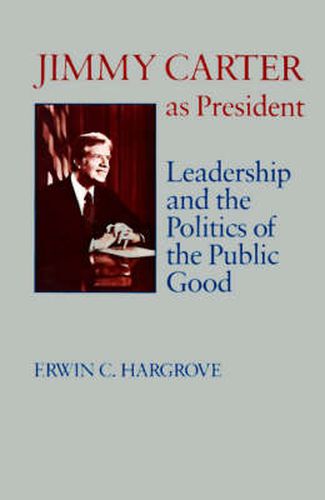Readings Newsletter
Become a Readings Member to make your shopping experience even easier.
Sign in or sign up for free!
You’re not far away from qualifying for FREE standard shipping within Australia
You’ve qualified for FREE standard shipping within Australia
The cart is loading…






This title is printed to order. This book may have been self-published. If so, we cannot guarantee the quality of the content. In the main most books will have gone through the editing process however some may not. We therefore suggest that you be aware of this before ordering this book. If in doubt check either the author or publisher’s details as we are unable to accept any returns unless they are faulty. Please contact us if you have any questions.
Jimmy Carter was, according to Erwin Hargrove, the first modern Democratic president to be substantially ahead of the party coalition. Concerned with issues of the future - inflation, the need for tax reform, energy shortages - Carter anticipated many questions that are only now being addressed, nearly a decade after his troubled tenure in office. The years 1976 to 1980 were difficult years for a Democrat to be president - especially difficult for a southern moderate who viewed the world in Wilsonian terms and who was politically unaligned, essentially an outsider in his party and in Washington. But Carter’s inability to read or manipulate the political scene was not the only problem to beleaguer his presidency. Events such as the Soviet invasion of Afghanistan and the capture of American hostages in Iran also worked against Carter, creating situations in which no amount of political acumen could have salvaged his presidency. Hargrove places Carter in historical perspective. Examining his frequently overlooked successes, as well as his failures, Hargrove analyses both the content and the methods of Carter’s policy leadership. His style of leadership is studied in the light of his beliefs and values, and of his problem-solving skills and experience. This profile draws heavily upon interviews with members of Carter’s White House staff. In a consideration for Carter’s domestic, economic, and foreign policies, Hargrove shows the congruence of purpose, politics, and process as a president shapes decision making. Because Carter was skilled at solving specific problems, he achieved notable successes - the Panama Canal Treaty, the Camp David Accord, and the SALT II talks - when he could keep matters in his own hands. Yet, despite such policy successes, his inability to build strong coalitions and delegate authority, exacerbated by uncontrollable world events, doomed Carter to political defeat. Throughout Jimmy Carter as President, Hargrove emphasises that in our assessment of presidents, we should evaluate skill within the historical context and thereby better understanding the ingredients of presidential success. Hargrove’s effective and extensive use of interviews proves the advantages of integrating oral history into scholarly research and writing.
$9.00 standard shipping within Australia
FREE standard shipping within Australia for orders over $100.00
Express & International shipping calculated at checkout
This title is printed to order. This book may have been self-published. If so, we cannot guarantee the quality of the content. In the main most books will have gone through the editing process however some may not. We therefore suggest that you be aware of this before ordering this book. If in doubt check either the author or publisher’s details as we are unable to accept any returns unless they are faulty. Please contact us if you have any questions.
Jimmy Carter was, according to Erwin Hargrove, the first modern Democratic president to be substantially ahead of the party coalition. Concerned with issues of the future - inflation, the need for tax reform, energy shortages - Carter anticipated many questions that are only now being addressed, nearly a decade after his troubled tenure in office. The years 1976 to 1980 were difficult years for a Democrat to be president - especially difficult for a southern moderate who viewed the world in Wilsonian terms and who was politically unaligned, essentially an outsider in his party and in Washington. But Carter’s inability to read or manipulate the political scene was not the only problem to beleaguer his presidency. Events such as the Soviet invasion of Afghanistan and the capture of American hostages in Iran also worked against Carter, creating situations in which no amount of political acumen could have salvaged his presidency. Hargrove places Carter in historical perspective. Examining his frequently overlooked successes, as well as his failures, Hargrove analyses both the content and the methods of Carter’s policy leadership. His style of leadership is studied in the light of his beliefs and values, and of his problem-solving skills and experience. This profile draws heavily upon interviews with members of Carter’s White House staff. In a consideration for Carter’s domestic, economic, and foreign policies, Hargrove shows the congruence of purpose, politics, and process as a president shapes decision making. Because Carter was skilled at solving specific problems, he achieved notable successes - the Panama Canal Treaty, the Camp David Accord, and the SALT II talks - when he could keep matters in his own hands. Yet, despite such policy successes, his inability to build strong coalitions and delegate authority, exacerbated by uncontrollable world events, doomed Carter to political defeat. Throughout Jimmy Carter as President, Hargrove emphasises that in our assessment of presidents, we should evaluate skill within the historical context and thereby better understanding the ingredients of presidential success. Hargrove’s effective and extensive use of interviews proves the advantages of integrating oral history into scholarly research and writing.